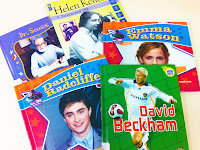
Vocabulary
Stimulate-(verb) encourages interest and activity.
Pattern- (noun) a repeated form or design.
Rhyme- (noun) a repetition of similar sounds.
Tone- (noun) a musical or vocal sound with reference to pitch, quality, and strength.
Nursery Rhyme- (noun) a simple traditional song or poem for children.
Haiku- (noun) a Japanese poem of seventeen syllables, in three lines of five, seven, and five
Limerick- (noun) a humorous verse of three long and two short lines that rhyme.
Simile- (noun) a figure of speech involving the comparison of one thing with another thing.
Vocabulary Activity
Please find the vocabulary words list above in the following word search.
Grammar Point
Punctuation is very important in any written form of language. The two most common forms on punctuation are the exclamation mark (!) a period (.) and a comma (,) The exclamation mark (!) indicates excitement. A period (.) is used at the end of a sentence, indicating to come to a full stop. A comma (,) indicate a brief pause. For example:
Happy Birthday!
We had cheese, crackers, and grapes.
On Friday I went to the mall.Please make 5 sentences using the proper punctuation marks.











